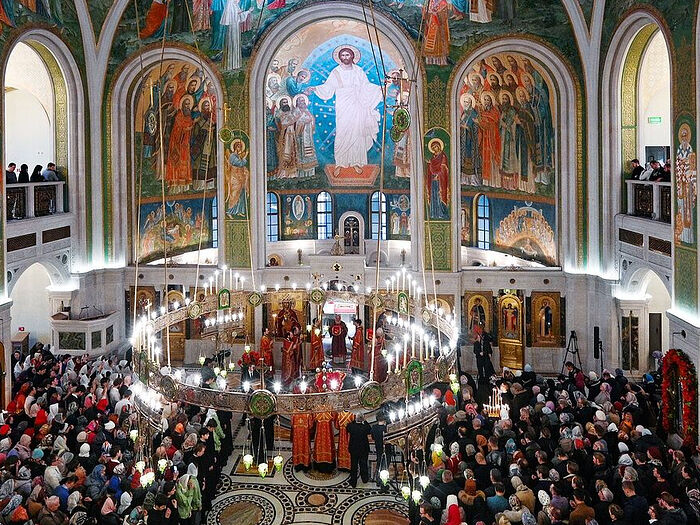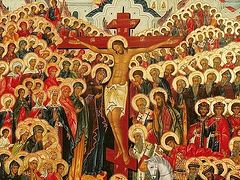All the Saints subdued Kingdoms, obtained promises, closed the mouths of lions, quenched fires. Women received their dead raised… Brethren, this is the first Sunday after Pentecost wherein the Holy Church has ordained that a general commemoration be held of All the Saints who pleased Christ throughout each land and in every time period. Today’s epistle reading, from the Holy Apostle Paul’s Epistle to the Hebrews, opens with the above quotation. And it is a poignant line. The Apostle defines for us the quintessential hallmarks of Sainthood. Of course, the Apostle Paul in the context of the Epistle to the Hebrews defines Saints as those who followed God’s Law in the Old Testament; for, he concludes his narration on them by saying even these did not obtain the promise (i.e. Christ). Yet, sainthood is sainthood, and the miracles evident in the Old Testament prophets and righteous are now multiplied many times exponentially thanks to the grace and power of Christ’s Gospel and His command to go make disciples of all nations. The Apostles, last Sunday, from fearful men were transformed into men of courage and valor with fortified hearts due to the coming of the Comforter, the Holy Spirit, at Pentecost. It is at Pentecost that the Apostles receive power from on high to dedicate the totality of their existence to the mission of making disciples of all nations through baptizing the nations and instituting Christ’s Kingdom—the Church—in their midst. And now, Sunday of All Saints, the Sunday that immediately follows Pentecost, we celebrate the fruit of that Apostolic labor. Today, we celebrate the millions of men and women throughout Christian history, known or unknown, who became actual disciples of Christ not only in words but in actions, and were therefore sanctified by His life-altering Grace.
All Christians are called to sanctity. The Apostle Paul defines, in his Epistle to the Galatians, in the fifth chapter, the goal of the Christian life. There we read, brethren, you are called to freedom. Life in Christ is full of these paradoxes. You lose your life, and find it. And now, you are called to freedom and sanctification, but this life-altering process goes up and through the path of Golgotha, the path of the Cross. The path of the Cross is the path of the Spirit. Those who are living the Gospel flee, as we continue to read in Galatians, from sexual immorality, impurity and debauchery; idolatry and witchcraft; hatred, discord, jealousy, fits of rage, selfish ambition, dissensions, factions and envy; drunkenness. All those who engage in these sins and passions maintain communion with the world, and, consequently, have no place with or in Christ and have no portion in His eternal Kingdom. All the Saints subdued Kingdoms, we heard. Yes, they subdued these Kingdoms of satan the Apostle described—that is the passions and sins. The Apostle Paul finishes the fifth chapter of Galatians with a plea to be genuine: Since we live by the Spirit, let us keep in step with the Spirit. Let us not become conceited, provoking and envying each other. What is inhibiting sanctification for today’s Christians is this, a lack of genuineness and the conceit, the infighting and the constant desire to provoke each other in all matters trivial and of no particular importance to the Orthodox Faith. In our time of endless access to information and the ability to quickly (and without much ado or thought process) declare our opinion and pontificate over each other on social media, there is perhaps no greater danger to the Church’s work than this rather prevalent state of provoking each other.
The remedy to our collective issues as a Church is sanctification, which is what sainthood means. Sainthood is composed of two or three main categories: Martyrs, (the most obvious category) due to the explicit nature of their confession, and Confessors, who confessed the Faith and may have been tortured for the Truth of Christ but were not executed, and the righteous and ascetics—those who denied the world and the world’s pleasures and lived for Christ alone in the state of monasticism. Needless to say that there are also other, though slightly less common categories, such as righteous monarchs, emperors and kings and queens. All the Saints throughout history, no matter where they lived or in what conditions prevailed or what status they had—all the Saints held one commonality: that they crucified their flesh with the passions and desires for the sake of Christ; that they loved Christ with the totality of their being and sought to live not for themselves alone but for the One Master and Benefactor. It is this intimate relationship with Christ Jesus and the keeping of His commandments, the living out of His Gospel and a clear witness through something called one’s testament of life in actions and deeds, with clear proofs—this is how sanctification is won: The Kingdom of Heaven suffers violence, and the violent overtake it by force. Yes, the Saints are violent—but not physically in the sense of violence of this world. No, the Saints are violent with actions for Christ: they go above and beyond what is expected, and the multiplication of the talents entrusted to them is a continuous endeavor. The Orthodox Church is far away from the questions asked by Western Christianity; that is to say, the Orthodox Church has never engaged internally with asking the question “Faith, or works?” When Protestants engage me on this question I remind them of the need to approach Orthodoxy for the sake of Orthodoxy, to understand the Orthodox Faith not through Protestant lenses, but (as much as is humanly possible) through the witness of the Saints throughout the totality of Christian history.
The Saints are the ones who were stoned, were sawn in two, were tempted, were slain with the sword. They wandered about in sheepskins and goatskins, being destitute, afflicted, tormented. They wandered in deserts and mountains, in dens and caves of the earth. Of whom the world was not worthy. The world—fallen mankind—was not worthy of the grace it received through the witness of the Saints. This is a witness of martyrdom and miracles. Yet, those from our midst who achieved their sanctification in Christ now intercede before Christ’s throne for the world, which was unworthy of their presence. We have, writes the Apostle Paul, so great a cloud of witnesses—and the Greek word here for witnesses is μαρτύρων that is, martyrs. Martyrdom means to bear witness; and those sanctified throughout time bear witness before the throne of God and make intercession for those in the world who are struggling to obtain the same reward they received. At the second reading at Vespers for the Sunday of All Saints, which is from the Wisdom of Solomon, we read that in the sight of men they were punished, their hope is full of immortality. Having been disciplined a little, they will receive great good, because God tested them and found them worthy of Himself. Now, since they—the Saints—have achieved to the hope of immortality, let us not hesitate to ask their intercessions and entreaties that we also, in our time and in our place, may do the work of Christ as He has empowered us to do—so that the Kingdom of His power and majesty may come and reign in our lives.
Let us honor the myriad of Saints not only with words but also with actions. The Greeks (and all Orthodox nations) loved the Saints with actions, and this is why you cannot find a mountaintop or forest or valley of seaside hamlet in Greece without a chapel dedicated to a particular saint—especially the Saints whose feasts fall in the spring and summertime, wherein it is relatively safe and not too arduous to venture there to celebrate a Liturgy in the Saint’s honor, and to guarantee his intercessions and support and blessing throughout the coming year. And, furthermore, to pray for the blessed repose of one’s beloved relations and kindred. These pilgrimages to such chapels and holy places took and continue to take on a communal spirit: the Liturgy is followed by a festive meal or refreshments set out in the Saint’s honor by the particular family or families which host the feast or celebrate the Saint. Papadiamántis, the nineteenth century Greek short story teller who is amongst the foremost of Greek authors (perhaps a Saint himself!) described, in his short story Drops of Water (1906), one such summertime pilgrimage to such a chapel dedicated to the Beheading of the Honourable Forunner. I quote it for your benefit extensively:
On the prominent heights of that northern outcrop, between Sidirókastro’s pebbled beach and Megáli Sárra—the bare, whitewashed mountain opposite—a magnificent vision unfolds. There, on the summit, pious folk built the Forunner’s chapel. The entire hamlet and the villages across converged for the meager feast. The twenty-ninth of August dawned. Throughout the eve, pilgrims—on a continuous litany from afar—descended on that sacred mountain darkening like ants its paths and roads. Others came with sailboats, with feluccas, or with rowboats from the western village, floating on the wind by sails and oars in that ocean, in that Kingdom of the North. At night, in the hours of profound mystery, when the autumn moon set, I emerged from the luminous Vigil of that chapel, and I sat by the oaks at the outcrop’s edge, to enjoy the splendid magic, the enchantment of the waxing and waning moon, which turned the rocks to the shade of silver, and the phosphorescent waves to that of daisy—the boundless and infinite vision—with the whisper of the wind from the oaks which mingles with the scent of wild honeysuckles, the murmuring of the ocean far-off, the rippling of the stream in the deep gorge, the rustling of the pines—the secret sounds of nature sleeping—as in a dream—swaying and sailing.
This is how the pious folk of old honored the Saints: with sacrifices and actions and labor and toil. The question remains: How do we honor the Saints in our context and in our time? It remains to us to re-discover our own Orthodox traditions surrounding the honor and veneration of our Saints, which ever-renew our Church-life, and are themselves life-giving; for they lead us to the source of life, which is Christ Himself. Having such a cloud of witnesses invisibly surrounding us, unsleeping as they are in their intercessions on our behalf, what could we fear on this perilous journey through the times and in the world? With love and sacrifice let us not hesitate to take up Christ’s Cross so we, too, at the appointed time may obtain the promise, which is none other than Christ Jesus Himself, the author and perfecter of our Faith.




